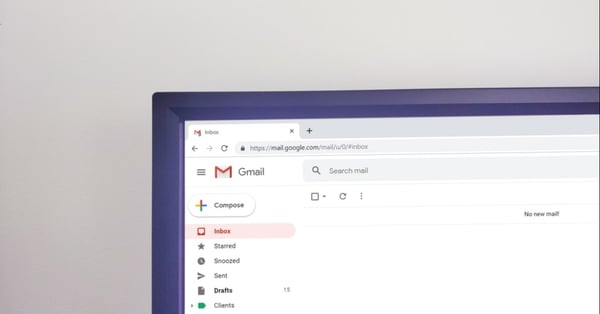When it comes to setting and tracking your marketing KPIs, you’re probably fully aware of the usual suspects. However, by tracking the right ones, your brand is less likely to report on and make decisions based on misleading information.

So which marketing KPIs should you track then? Depending on your particular business plan and marketing efforts, some digital marketing metrics may be more important than others. Here are the ones that, in our experience, matter most to marketers.
- I Want to Convert My MQLs to SQLs
- I Want More Website Traffic
- I Want to Send Better Performing Emails
- I Want My Social Platforms to Be Engaging
- I Want My ROI to Be Accurate
1. I Want to Convert My MQLs to SQLs
-1.jpeg?width=600&name=photo-1557804506-669a67965ba0%20(1)-1.jpeg)
Not all leads are created equal. Be sure you’re familiar with the difference between Marketing Qualified Leads (MQLs) and Sales Qualified Leads (SQLs). These are simply different lifecycle stages of the same lead.
MQLs are those who have raised their hands (say by downloading an eBook and receiving a follow-up email) but haven’t yet become fully-fledged opportunities.
An SQL is someone your sales team has accepted as worthy of a direct sales follow-up. SQLs have been investigated much further and indicate a prospect is ready to make a decision.
Out of all your MQLs, how many get promoted to SQL status? Understanding the synergy between both is essential. Especially when it comes to understanding the number of leads you’ve received over a specific period of time divided by the actual amount of leads you’ve closed.
If there's clear communication and understanding between these two teams, you can expect this ratio to be high. However, there’s usually a disconnect between these teams. It might be the case that marketing is generating a tonne of leads but sales aren’t capitalising on them, resulting in a low MQL to SQL ratio.
You most certainly won’t know this if you aren’t measuring this KPI. So why not start now?
2. I Want More Website Traffic

Your website serves as the face of your brand. It helps turn potential leads into eventual customers so it’s a chance to get to know more about them.
Getting to know your website traffic is about finding out who these people are, where they’re from and what they did when they got to your site. All of this information can help you determine one all-important piece of information: what it is they want from you.
Knowing this helps you anticipate your potential customers’ needs - which is what marketing is all about, right?
Website traffic is probably too generic of a term, however. The idea of website traffic consists of many things, all of which you’ll be pleased to know are highly measurable and heavily related to engagement.
They include:
- Sessions.
- New visitors vs Returning visitors.
- Page views.
- Traffic by source.
- Conversion rate.
- Page per session.
- Average session duration.
- Bounce rate.
- Exit rate.
Measuring website traffic metrics regularly will provide you with a number of insights such as which campaigns are working and when.
TIP: If at any point you see a steady decline in traffic, consider troubleshooting your website. You may find broken links, pages with optimisation opportunities and other technical issues potentially deterring visitors.
3. I Want to Send Better Performing Emails

If you’re list building (and you should be), this is one of the most important email marketing metrics you need to keep your eye on.
Your email open rate measures the number of people who open your email campaign compared to the overall number of those who received it.
High open rates indicate:
- Properly segmented list.
- Attractive subject line.
- Appropriate send time.
You should judge and analyse every email marketing campaign. Low open rates tell you at least one if not all of those factors above is lacking. More important than email open rate is email click-through rate. This measures the number of subscribers that click the links in your email.
Emails include its own set of KPIs that you should dissect a little more:
- Delivery rate.
- Unsubscribe rate.
- Open rate.
- Click-through rate.
- Conversion rate.
- Forward/Shares.
This gives you tremendous insight into the quality of your lead generation efforts.
If users aren’t engaging with your email content then you need to take a closer look at your lead gen campaigns.
4. I Want My Social Platforms to Be Engaging

Well, Facebook is still the most popular social media platform with 2.38 billion active users as of July 2019. Your social media strategy is a huge part of your marketing efforts because it allows you to distribute your content and interact with your current and potential customers. But you already knew that.
A good way to judge this KPI is to track your growth (think followers on Twitter and likes on Instagram). Both social media sites have built-in tracking and analysis that makes it incredibly easy to get this data when needed.
You can also track engagement through metrics that determine lead conversions, customer conversions and percentage of web traffic associated with your social media efforts.
Remember, not all social media will work for your business so be sure to track the ones that really matter resonate with your target audience.
5. I Want My ROI to Be Accurate

I’m all for KPIs that measure cost – these are the measurements that help calculate digital ROI. When working with costs, you’re going to need more than just trusty Google Analytics.
You'll need to pull data from anywhere you’re spending money: Facebook Ads, Twitter, AdWords, PPC etc.
The return on investment marketing metric should come as no surprise - it serves as a true baseline for success. Basically, ROI equates to how much you spent (investment) vs. how much you earned (return).
Simple - we know - but it’s easy to lose track of exactly what you’re spending on marketing. Ensuring you properly calculate your online marketing campaign’s ROI will be the key to determining if it was an overall success or not.
Finally, always use the analysis of your incoming data to guide the next steps.
The five KPIs we've mentioned above are a great way to begin. As you grow, you'll realise that you need to track even more for your brand which means a bigger investment in resources.
To help get you started, we've created a handy budget calculator.
Use Our Campaign Budget Calculator to Make the Most out of Your Resources
Budgeting can be tricky, especially when we’re whizzes at marketing rather than number crunching. You can use our handy little budget calculator so you can justify concrete ROIs and solidify your branding budgets.
It’s easy to use and gives you clear figures to take away. Get access to it by clicking the link below.

